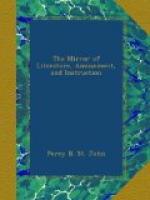Free Emigrants.
Of what class then, you ask, have been the great mass of emigrants from England, not convicts? Excellent people in their way, most of them; farmers, army and navy surgeons, subalterns on half-pay, and a number of indescribable adventurers, from about the twentieth rank in England. They came here to live, not to enjoy; to eat and drink, not to refine; “to settle”—that is, to roll in a gross plenty for the body, but to starve their minds. To these must be added convicts, many of whom are become rich and influential; and some, not exactly convicts, to whom England ceased to be a convenient residence. The English who live at Boulogne, some for cheapness, some from misfortune, and some from fear, would offer, I should think, a fair sample of the materials which compose the best society in New South Wales; though, I must admit, that the bustling, thriving settler of New South Wales is a companion, rather ignorant though he be—far away preferable to the not more enlightened, but melancholy English sluggard of Boulogne. To form a due conception of the “upper classes” here, suppose all the natives of France annihilated, and the whole country belonging to the English residents of Boulogne. In that case, there would be an almost perfect resemblance between those Englishmen who, across a narrow channel, can see their own country, and those who, at its antipodes look upon the Pacific Ocean.
Society and Manners.
As in France, the first class call themselves “gens comme il faut;” and in England, “people of fashion,” or “the world”—so here, the leaders of society are distinguished by a peculiar term. They are called “respectable.” Not to speak of France, it is difficult to say what in England constitutes “fashion.” Not high birth, certainly—for some of the despots of English society are sprung from the dunghill. Our epithet to express exclusiveness is, I think better chosen—for, though strictly speaking, it means worthy of respect, it is claimed, here, only by those to whom respect is paid. In England, the Quarterly Review tells us, “respectability” sometimes means keeping a gig—here it always means dining with the governor.
Our manners set the fashion. Those whom we exclude, exclude others. Free emigrants claim to be of a nature superior to convicts; convicts, whose terms of punishment have expired, behave as if their flesh and blood were wholly unlike that of convicts still in durance; convicts, who have not been convicted south of the line, scorn those who have; and these several classes, except the last, are as proud and tenacious of their privileges as is every distinctive class in England, except the unhappy lowest; or, as is every shade of colour in the West Indies except the perfect black.
The Population
Of the settlement may amount in round numbers to 45,000. Of these only 14,000, including women and children, have not been convicted of felony; and two-thirds of the remainder, seven-eights being grown men, are galley-slaves, still in chains!




